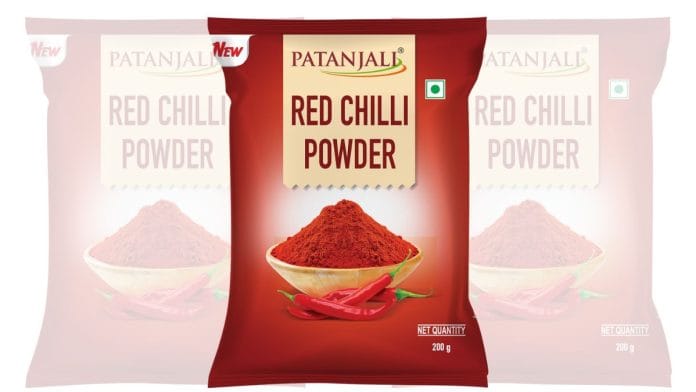New Delhi: India’s apex food regulator has asked yoga guru Baba Ramdev-led Patanjali Foods to recall an entire batch of its packaged red chilli powder this month over non-compliance with food safety norms, but has not issued any public alert to inform consumers about the recall.
Patanjali Foods, one of the country’s top fast-moving consumer goods (FMCG) companies, said in an exchange filing Thursday that the Food Safety and Standards Authority of India (FSSAI) had asked it to initiate the recall of the entire batch of the implicated product—red chilli powder, batch number JD2400012.
The order was issued on 13 January and received by the company three days later.
According to the exchange filing, the order cites non-conformance with the Food Safety and Standards (Contaminants, Toxins and Residues) Regulations, 2011, indicating that the product has failed to meet permissible safety parameters. However, it does not specify the exact nature of the violation.
“Patanjali Foods Limited has recalled a small batch of four tonnes of red chilli powder (200-gram pack),” Sanjeev Asthana, CEO, Patanjali Foods Limited, told ThePrint.
“The product sample, when tested, was found not to conform to the maximum permitted limit of pesticide residue. The FSSAI sets Maximum Residue Limits (MRLs) for pesticide residues in various food items, including red chilli powder,” he added.
“In line with specified regulatory norms, the company has taken immediate steps to inform its distribution channel partners and has released advertisements to reach out to consumers who have purchased the product, urging them to return it to the place of purchase and claim a full refund.
“The value and volume of the recalled product are very small. The company is conducting an assessment of its agricultural produce suppliers and implementing measures to enforce stringent quality control processes for the procurement of agricultural produce, ensuring full compliance with FSSAI regulations.
“The company remains committed to maintaining the highest quality standards across all its products and ensuring a fully compliant supply chain.”
ThePrint has reached FSSAI CEO Kamalavardhan Rao for comment via phone, email, and text message. This report will be updated if and when a response is received.
Also Read: Cancer warning on liquor bottles ‘long overdue’. Even ‘light’, ‘moderate’ drinking poses threat
Concerns over spice safety
Last year, the FSSAI had ordered the sampling of various branded spices for quality assessment following reports that two Asian countries had banned Indian spice brands over safety concerns.
This came after Hong Kong and Singapore reported detecting high levels of ethylene oxide—a carcinogenic chemical—in various spice products manufactured by Everest and MDH, two of India’s largest spice producers.
The World Health Organization (WHO)’s International Agency for Research on Cancer (WHO-IARC) has classified ethylene oxide as a Group 1 carcinogen, meaning there is sufficient evidence to establish it as a cancer-causing substance.
Despite the sampling exercise, no official findings have been made public.
‘Major gap in recall norms’
According to FSSAI statistics, 1,70,513 samples—including dairy, vegetables, pre-packaged food, and spices—were tested for quality in 2023-24.
In the previous financial year (2022-23), a total of 1,77,511 food samples were tested across India, and 44,626 (25 percent) were found to be non-conforming—either unsafe, substandard, misbranded/mislabelled, or associated with misleading advertisements.
Under India’s food safety laws, offences such as selling or manufacturing substandard food, misrepresenting food products, spreading deceptive information through advertising, failing to comply with prescribed safety standards, or using prohibited adulterants can attract penalties and imprisonment—up to a life sentence in extreme cases.
FSSAI figures presented in Rajya Sabha last month showed that in 2023-24, non-conforming foods led to 28,906 civil cases and 4,946 criminal cases.
However, the law places the entire responsibility for recalls on manufacturers. Under FSSAI’s 2017 food recall guidelines, manufacturers and distributors are required to initiate a recall to protect public health when products present a risk of injury, gross deception, or other defects.
Companies may also be required to initiate a recall if notified by government authorities.
However, the regulations do not mandate manufacturers or the FSSAI to publicly disclose recall details.
“The Food Authority will publicise the recall when it is of the opinion that the public needs to be alerted about a health hazard or when clarification is required to allay public concerns,” the guidelines say.
‘Lack of transparency in food safety regulation’
Food safety experts and consumer rights activists argue that this represents a major regulatory gap.
“In most developed countries, food safety authorities promptly publicise information when food products fail to meet safety standards, as such issues have direct health implications. However, FSSAI’s recall norms do not require such disclosures,” a food safety expert from the Indian Council of Medical Research-National Institute of Nutrition (ICMR-NIN), who wished not to be named, told ThePrint.
Ashim Sanyal, chief operating officer (COO) and secretary of Consumer Voice, a Delhi-based consumer advocacy group, said his organisation has repeatedly urged the FSSAI to strengthen recall guidelines and introduce measures to “name and shame” companies that violate food safety standards.
“Consumers have every right to know if a product they have purchased is non-conforming, especially when food safety is at stake. The gap in the law is particularly concerning in such cases,” Sanyal emphasised.
“But the FSSAI’s approach seems more aligned with protecting the food industry rather than ensuring public health,” he added.
Sanyal also raised concerns about the red chilli powder already sold to consumers.
“What happens to the red chilli powder packs that have already been purchased? Don’t consumers have the right to know the extent and nature of the food safety violation?” he asked.
(Edited by Radifah Kabir)
Also Read: High fluoride in drinking water lowers IQ in kids, shows data from India, 9 other countries






